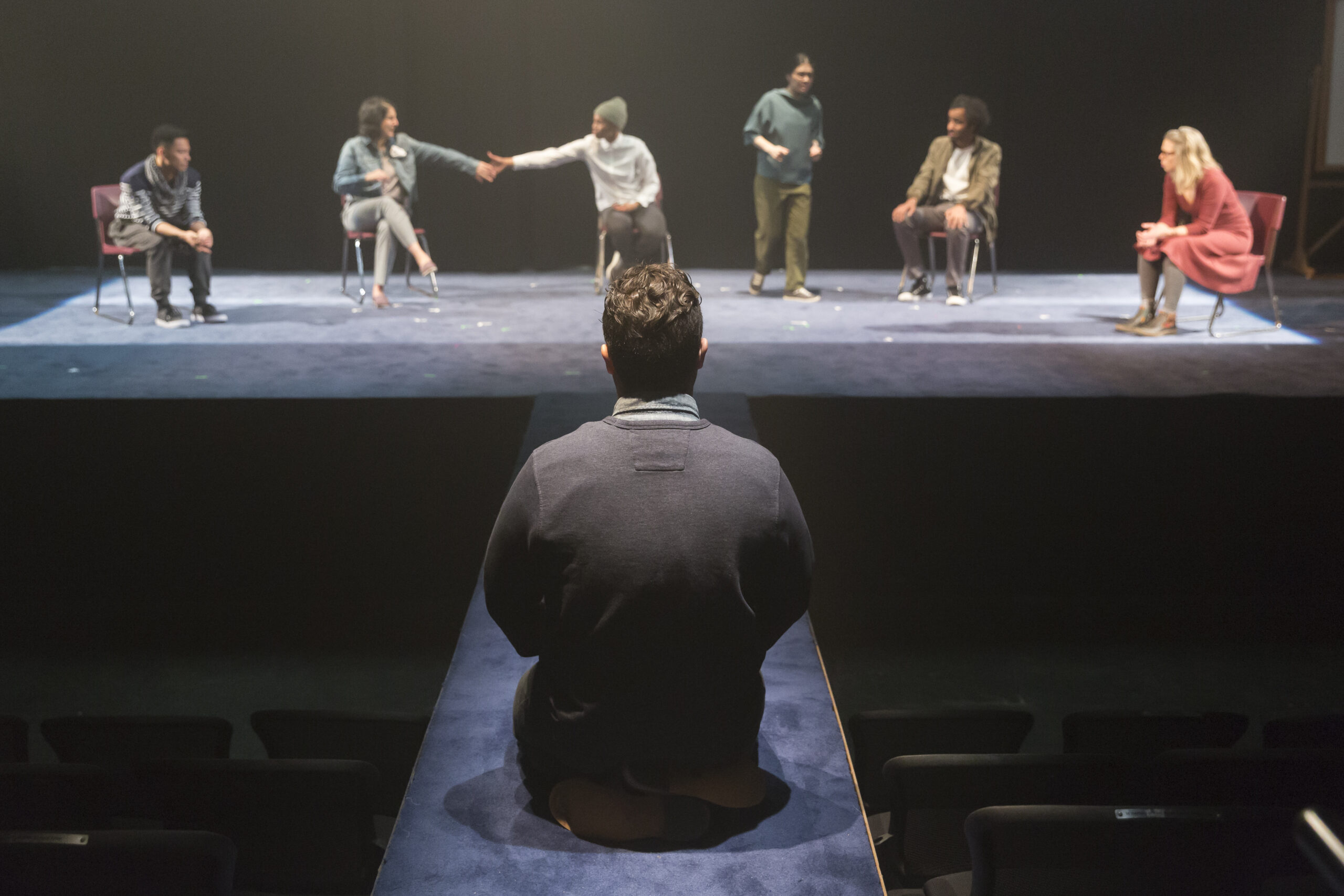Securing the Future
“When [Dr.] Kathleen [Gallagher] came to me,” playwright and theatre creator Andrew Kushnir begins, “she said, ‘I don’t want to engage artists as mouthpieces. What would it mean to embed you in the DNA of this project?”
Gallagher, a published author who specializes in Arts Education, had just observed a drama workshop Kushnir and his fellow Project: Humanity counterparts had led at a school where she was conducting research. She’d also recently seen their play, The Middle Place, which was on a twenty-one school tour of Ontario in between its premiere at the 2011 SummerWorks Theatre Festival, and its Dora Award-nominated run at Canadian Stage. For that play, Kushnir had assembled hundreds of hours of interviews with teens in the shelter system into a verbatim play that (anonymously) laid bare their dreams, hardships, and lives. Gallagher was envisioning that Project: Humanity would similarly create a play of the students she was meeting and observing at drama workshops around the world.
The resulting project—and now the play—Towards Youth, spanned five years of research and interviews. Actor Liisa Repo-Martell, who plays Gallagher in the play that has just premiered at Crow’s Theatre’s Streetcar Crowsnest space recalls the first table reading: “It was 900 pages; a gigantic table covered with scripts. Each of the study sites [schools in Canada, England, Greece, India, and Taiwan] had a full length play of material. So, we’ve had to whittle it down,” she says, chuckling.
Despite having several other projects on the go over the past half-decade, Kushnir was keen with the opportunity to connect with students around the world. “Young people have always been a major constituency for us; that stems from our ongoing youth shelter work. We want to make spaces for the, well, personhood of youth, in ways that undermine stereotypes and two-dimensional representations of young people. Verbatim theatre has been really useful for that. It witnesses and records fleeting moments, and then, in the theatre, we try to re-embody them. The audience will have that moment with that young person, and then it’ll be gone.”

Andrew Kushnir with students in Taiwan
Repo-Martell is the only actor in the play who portrays just one person. The rest of the nine performer cast employ thirty-five youth voices and twenty-one adult voices in the play, including the ‘Kushnir character’ (he does not himself appear on stage, but shares co-directing duties with Crow’s Theatre’s Chris Abraham). Actors Amaka Umeh and Stephen Jackman-Torkoff are both relatively close in age to the students they play (Jackman-Torkoff celebrated a birthday during the previews, ushering him into his “mid to late twenties”), and for them, the show brings back fond memories of their time as drama students. “Embodying all these students, and their spirits, feeling like I’m in a drama classroom again, it’s a reminder of that freedom, and fearlessness, and lack of self-judgement, which can lead to almost magical discoveries,” he says. “It was amazing to revisit,” says Umeh. “And we [the nine person cast] are our own drama class, in a way, so I’m grateful for how its reminded us, as professionals, that we’re playing, and it’s a nurturing environment for that. We could make a mess of things [in rehearsal], and then return and refine.”
“The drama classroom can be a place set aside from the rest of school,” muses Repo-Martell. “People are asked to engage, with their real selves, in a way you’re not asked to in, say, geometry. Something is awakened in people, then. [Gallagher] says in her book that the drama classroom can be a ‘workshop for democracy.’ People find their voices and learn to compromise in a group.”
All those benefits the actors see are what Kushnir posits as the value of Arts Education that the students he interviewed have received, whether they are in a grade 11 classroom in Toronto, or an academy in India “that employs critical feminist pedagogy to help lower caste girls change their futures, families, and neighbourhoods.” One of the examples he references in talking about the leadership qualities drama studies develop is the student activists from Parkland, Florida who survived a school shooting to become leaders in the gun control debate in the United States. It works for teachers in some ways, too, as we both note our current Prime Minister’s background. “We’ve tweeted at him,” says Kushnir, grinning. “He’s arguably the most famous former drama teacher in the country—the world, probably. [Gallagher] specialized in all-girl schools early in her career, and Trudeau has her book about it—it’s a small world.”
Umeh also notes those benefits extend beyond politics and activism. “You learn to dream bigger, outside of the reality you’re facing outside of class. You can bring those problems you face in the world into a space where you can be heard, and—possibly—arrive at solutions. I mean, that’s why corporate businesses use drama workshops for team building, right?”

Liisa Repo-Martell, Jessica Greenberg, Loretta Yu, Amaka Umeh, Zorana Sadiq, Stephen Jackman-Torkoff, Tim Dowler-Coltman, Aldrin Bundoc, and Emilio Vieira in Towards Youth – Photo by Aleksandar Antonijevic
Repo-Martell had a different educational background than her fellow castmates, who all studied drama in high school and at theatre school; her parents were education activists and the founders of the influential publication, This Magazine Is About Schools—now shortened to This. “I barely went to high school, and I didn’t go to theatre school; but, I was raised in a home that thought about these things for a long time. My parents really respected me from a young age, so I had that environment at home; I have no formal education, but I have a high opinions of my opinions,” she says, laughing.
Another aspect Umeh has noted about the play is that ‘youth’ can be an entry point into intersectional thought, as she expressed in a promo video for the show. Basically, since we’ve all been young (“It is a temporary condition, but so is life?” she cracks), it may be an entry point for someone who doesn’t easily empathize with someone who’s queer or of colour (topics Kushnir’s previous play, Small Axe, tackled). “We can all still be young, even if we’re not youths,” she enthuses, “we can sustain that drive and imagination.”
Unlike The Middle Place, Kushnir doesn’t see this show touring to schools, despite the important message he wants audiences to take away from it. “Bringing this show into a school setting might dismantle it,” he theorizes. “Creating this space—a theatre space that has layers, and levels of design—it’d be challenging to take to schools, in the way that The Middle Place was. Even Crow’s space has never been set up like this before, for this show. It’s very carefully designed to focus the audience’s attention. The play’s title is, itself, an orientation: Towards Youth, towards individuals we usually tune out.”
All of the theatre creators seem to be on the same wavelength about what these student’s voices can impart, and what they recognize in themselves. “Learning how to talk to other people, to connect to them, and be vulnerable with them, is more valuable than career skills, I think,” says Jackman-Torkoff. “It’s about imagining, and discussing, a brighter future,” declares Umeh, “What’s going right, what’s going wrong. I can’t see how developing those qualities wouldn’t be beneficial to society.”
“We live in a society where people’s full selves aren’t usually asked for in their work,” says Repo-Martell. “Drama studies encourage continued creative engagement in the work people do, and how to make their voices matter. If they get used to that, it’s a heady feeling—you get addicted to it! (I do say that in the play).”









Comments